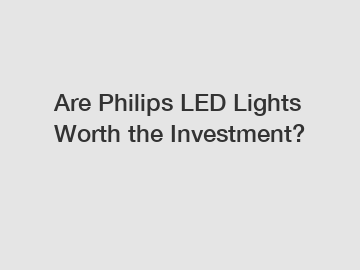Are Philips LED Lights Worth the Investment?
Are Philips LED Lights Worth the Investment?
In today's rapidly advancing world, energy-efficient lighting has gained immense popularity. Among the various options available, Philips LED lights have emerged as a leader in the market. But are they truly worth the investment? In this article, we will delve into the features, benefits, and drawbacks of Philips LED lights to help you make an informed decision.
Point 1: Energy Efficiency.

One of the primary reasons people choose Philips LED lights is their energy efficiency. LED technology ensures that these lights consume significantly less energy compared to traditional incandescent or fluorescent bulbs. According to Philips, their LED lights can save up to 80% of energy, making them an attractive choice for both residential and commercial settings. By reducing energy consumption, Philips LED lights not only help cut down electricity bills but also contribute to a greener planet.
Point 2: Long Lifespan.
Another key advantage of Philips LED lights is their impressive lifespan. While traditional bulbs typically last around 1,000 hours, Philips LED lights have an estimated lifespan of up to 25,000 hours or even more. This means fewer replacements, lower maintenance costs, and less waste generation. Although Philips LED lights may initially appear more expensive than their counterparts, their extended lifespan makes them a cost-effective option in the long run.
Point 3: Versatility and Quality.
Philips LED lights are available in a wide range of configurations to cater to various lighting needs. Whether you require warm white, cool daylight, or colored lighting, there is a Philips LED option for every mood and atmosphere. Furthermore, Philips is renowned for its commitment to quality. Their LED lights offer a consistent color rendering index (CRI), ensuring accurate and vibrant colors in your living or working spaces. The high-quality materials used in Philips LED lights also contribute to their durability, making them a reliable choice for any lighting application.
Point 4: Environmental Impact.
An essential factor to consider when evaluating any product is its impact on the environment. Philips LED lights shine in this department too. Their energy efficiency not only reduces carbon emissions but also helps conserve natural resources. Additionally, LED lights do not contain toxic substances like mercury, which are present in fluorescent lamps. By opting for Philips LED lights, you are not only investing in cost-effective lighting but also contributing to a sustainable future.
Conclusion:
Considering the points discussed above, it becomes evident that Philips LED lights are indeed worth the investment. Their energy efficiency, extended lifespan, versatility, and quality make them an attractive choice. By opting for Philips LED lights, you can significantly reduce your energy consumption, lower maintenance costs, enjoy vibrant and reliable lighting, and contribute to a greener planet. While the initial cost may seem slightly higher, the long-term benefits far outweigh the investment. So, if you are looking to upgrade your lighting system, consider Philips LED lights for a brighter, eco-friendly, and cost-effective future.
Want more information on PHILIPS HLS168, philips wt069c, philips rs100b? Feel free to contact us.

Comments
0